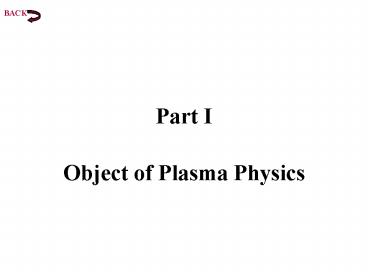Object of Plasma Physics PowerPoint PPT Presentation
1 / 46
Title: Object of Plasma Physics
1
Part I
BACK
- Object of Plasma Physics
2
I. Object of Plasma Physics
- 1. Characterization of the Plasma State
- 2. Plasmas in Nature
- 3. Plasmas in the Laboratory
3
Natural and Laboratory Plasmas
4
Typical Values for the Debye Length
- Typical values of Debye Length under different
conditions - n m-3 TeV Debye Length
m - Interstellar 106 10-1 1
- Solar Wind 107 10 10
- Solar Corona 1012 102 10-1
- Solar atmosphere 1020 1 10-6
- Magnetosphere 107 103 102
- Ionosphere 1012 10-1 10-3
5
Interstellar Plasma Exploration
6
Interstellar Plasma Exploration
7
Interstellar Plasma Mission Objectives
- Measure the interstellar magnetic field and the
density, temperature, and ionization state of the
interstellar gas - Determine the interstellar spectra of galactic
cosmic rays and their contribution to the
ionization, heating, and dynamics of the
interstellar medium. - Determine the mass and velocity distributions and
the composition of interstellar dust - Measure the elemental and isotopic composition of
interstellar plasma, neutral gas - Measure cosmic ray electrons and positrons and
study their implications for galactic gamma ray
production, recent nucleosynthesis, and
interstellar radio emission
8
The Plasma in the Stars
The Sun a very old fusion reactor
9
The Sun-Earth Connection
The solar wind is a stream of charged nuclei (H,
He) constantly emitted from the Sun
10
Earth Magnetosphere
Dipolar Earth magnetic field
11
(No Transcript)
12
Earth Ionosphere
Ionospheric plasma interactions
13
Earth Ionosphere (II)
The Sun
Galactic Cosmic Rays
Ionospheric plasma interactions
Earth Magnetosphere
Detectors on ISS
14
I. Object of Plasma Physics
- 1. Characterization of the Plasma State
- 2. Plasmas in Nature
- 3. Plasmas in the Laboratory
15
The Deuterium Tritium Reaction
16
Fusion Experiments
17
The First Tokamak (Moscow, Russia)
18
The DIII-D Tokamak (San Diego, CA, USA)
19
The DIII-D Tokamak (San Diego, CA, USA)
20
The DIII-D Tokamak (San Diego, CA, USA)
21
The Jet Tokamak (U.K.)
22
The Jet Tokamak (U.K.)
23
The Jet Tokamak (U.K.)
Inside the torus the Mascot Remote Handling
Manipulator on the end of the boom, during the
Remote Tile Exchange phase
24
The Z-Pinch Concept
25
The ZaP Z-Pinch Experiment (Seattle, WA)
26
The MIT Levitated Dipole eXperiment (Boston, MA)
27
The MIT Levitated Dipole eXperiment (Boston, MA)
28
The MIT Levitated Dipole eXperiment (Boston, MA)
29
The Field Reversed Configuration (Seattle, WA)
30
Imploding FRC Experiment (Los Alamos, NM)
31
The Stellarator (Garching, Germany)
32
The Stellarator
Simulated Stellarator confined plasma surface
33
The Helically Symmetric eXperiment (Madison, WI)
34
Industrial Plasmas
35
Industrial Plasmas (II)
36
Industrial Plasmas - Consumer
- High-efficiency lighting
- Manufacturing of semiconductors chips (wafer
etching) - Flat-panel displays
- Surface treatment of synthetic cloth for dye
adhesion
37
Fluorescent Lamp
- A fluorescent lamp is shown here with part of the
phosphor coating removed to reveal the blue
plasma glow inside. The phosphor is the white
coating on the lamp wall. - The plasma excites lamp's phosphor coating to
produce the visible light
38
Arc Lamps
- In high-intensity arc lamps the light is
generally produced directly by the plasma. - Color characteristics are controlled by the
chemical elements put into the plasma rather than
by a phosphor coating on the wall.
39
Plasma displays
- Plasma displays generally consist of two glass
plates, each containing parallel electrodes,
sealed to form an envelope filled with a neon and
xenon gas mixture. - A gas discharge plasma is created by applying an
electric field between the electrodes.
40
Plasma displays (II)
- The plasma generates ultraviolet light which in
turn excites the phosphor coating inside the
glass envelope. - The phosphor emits a single color of visible
light. - Each pixel consists of three sub-pixels, one
each of red, green and blue. - By combining these primary colors at varying
intensities, all colors can be formed.
41
Isotope Separation
- Plasma sources and magnetic field control of
gyrating charged plasma particles can be used for
the separation of stable isotopes for medical and
industrial use.
42
Plasmas for Sterilization
- One-atmosphere plasma systems are now becoming
available for various industrial applications. - One-atmosphere plasma systems make possible new
methods for surface cleaning (sterilization for
food, medical, and other applications) - Heat sterilization is time consuming and
irradiation can damage materials this new plasma
technology has been shown to kill bacteria on
various surfaces in seconds to minutes. - In addition to destroying bacteria, such plasma
systems also destroy viruses, fungi and spores. - These systems also provide an environmentally
benign method for pre-treating surfaces.
43
Aerospace Technology
- Modification of Aerodynamic Drag flat panel with
a layer of one-atmosphere plasma undergoing wind
tunnel testing. (Univ. of Tennessee)
44
Aerospace Technology
- Microwave generated plasma around a catalyst for
removal of NOx and CO from engine exhausts
45
Aerospace Technology
- Test of electrostatic ion thruster in large
vacuum chamber
46
Aerospace Technology
- Robotically controlled plasma spraying of
high-temperature shielding tiles

